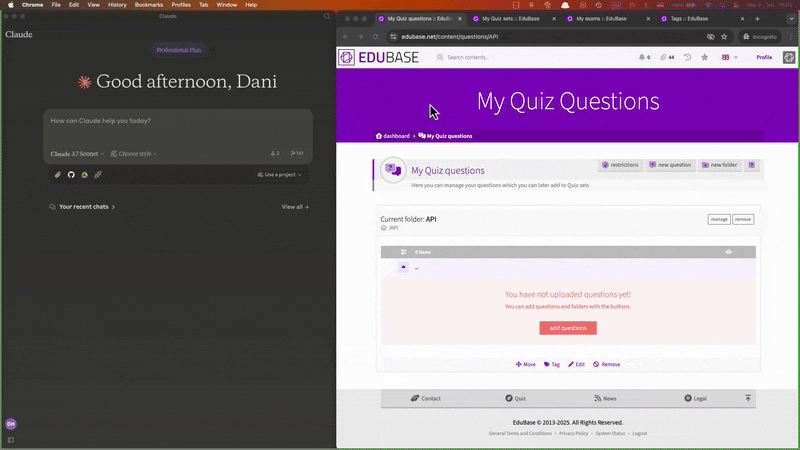About
The EduBase MCP Server enables Claude Desktop and other LLM clients to securely interact with your EduBase account, performing tasks such as uploading quizzes, scheduling exams, and analyzing results via stdio, SSE, or HTTP transports.
Capabilities

EduBase MCP Server is a specialized implementation of the Model Context Protocol that bridges Claude (or any MCP‑compatible AI assistant) with the EduBase educational platform. By exposing every REST endpoint of EduBase as a distinct MCP tool, it allows an AI to act on behalf of a user—creating quizzes, scheduling exams, fetching student analytics, and more—all while preserving the platform’s security model through API credentials.
The server solves a common pain point for educators and corporate trainers: the friction of manual data entry and repetitive administrative tasks. Instead of switching between a browser, spreadsheets, or custom scripts, an assistant can interpret natural language requests and translate them into authenticated API calls. This streamlines workflows such as “generate a LaTeX quiz on quadratic equations,” “schedule a mid‑term for class 10A,” or “export the top five performers from last week’s assessment.” The result is a more efficient, error‑free process that frees instructional designers and trainers to focus on pedagogy.
Key capabilities include:
- Full API coverage: Every EduBase endpoint becomes a callable tool (), enabling granular control over content, users, and analytics.
- Transport flexibility: The server supports stdio, Server‑Sent Events (SSE), and streamable HTTP, giving developers the choice of how data flows between client and server.
- Secure integration: Credentials are managed via environment variables (, , ), ensuring that only authorized applications can interact with the platform.
- Rich data handling: Tools can return structured JSON, allowing downstream AI reasoning or UI rendering without additional parsing logic.
Real‑world scenarios that benefit from this MCP server include:
- Dynamic content creation: An instructor asks the assistant to generate a set of practice problems; the AI calls , uploads LaTeX‑formatted questions, and receives a quiz ID instantly.
- Automated grading pipelines: After an exam, the assistant pulls student responses via , calculates scores, and updates dashboards with a single command.
- Learning analytics: Stakeholders request insights like “show engagement trends over the last quarter”; the assistant queries and presents a concise report.
Integration into AI workflows is straightforward. An MCP client, such as Claude Desktop, automatically discovers the available tools through the server’s introspection endpoint. Once authenticated, developers can compose prompts that reference these tools by name, and the assistant will handle parameter extraction, request signing, and streaming of responses. This tight coupling removes manual API calls from the development loop and embeds EduBase’s full feature set into conversational AI experiences.
What sets EduBase MCP apart is its commitment to educational excellence: the platform’s advanced quiz engine, real‑time cheating detection, and LaTeX support are all exposed to AI assistants, enabling sophisticated educational interactions that were previously only possible through the web interface. For developers building AI‑powered training solutions, this server offers a single, secure entry point to leverage EduBase’s rich ecosystem without writing custom connectors.
Related Servers
MarkItDown MCP Server
Convert documents to Markdown for LLMs quickly and accurately
Context7 MCP
Real‑time, version‑specific code docs for LLMs
Playwright MCP
Browser automation via structured accessibility trees
BlenderMCP
Claude AI meets Blender for instant 3D creation
Pydantic AI
Build GenAI agents with Pydantic validation and observability
Chrome DevTools MCP
AI-powered Chrome automation and debugging
Weekly Views
Server Health
Information
Explore More Servers
Git Mob MCP Server
Co-author management for pair and mob programming
ProjectDocHelper
Generate project docs, feed AI tools via MCP
GitHub MCP Server
Unified GitHub integration for AI agents
Make.com MCP Server
Cloud‑hosted, zero‑code MCP for Make.com workflows
MCP MongoDB Server
LLM-powered interface to MongoDB with smart ObjectId handling
IoT Device Control MCP Server
Standardized IoT device control via Model Context Protocol